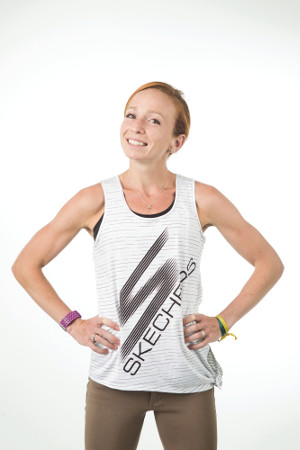CONNECT Converse
Keeping Up with Esther Erb Atkins
Running to Her Own Beat
 PHOTO: Marie Freeman
PHOTO: Marie FreemanEsther Erb Atkins
Esther Erb Atkins (CWR '08) didn't start running competitively until high school, but now ranks among the world's top marathoners. She won a U.S. Marathon title in 2014, earning the opportunity to represent Team USA in 2015 at the World Championships, where she placed 24th. At Case Western Reserve, she became the first woman in university history to qualify for the NCAA Cross Country Championships, and led the team to 10th and sixth-place finishes in 2006 and 2007. She was a nine-time national qualifier, six-time All-American and a Fulbright scholar, and she capped her collegiate career with an individual national championship in the 10,000-meter run. She lives in Greenville, South Carolina, where her husband, Cole—a runner she met at an elite training center—coaches at a soccer academy. She is training for her next marathon and in recent years helped train college cross-country and track teams.
What are your lasting impressions of your time at the university?
As poet Maya Angelou said, "People will forget what you said, people will forget what you did, but people will never forget how you made them feel." I always felt really well cared for by my advisor, Ross Duffin [the Fynette H. Kulas Professor of Music], and my coach, Kathy Lanese.
What drew you to running, especially at an elite level?
I started playing cello at age 3 and learned about the discipline of practicing your art every day—and what it takes to really be great at something. I started running as a senior in high school, and it's like a light went on in my head. Immediately it was something I wanted to do every day. What makes running so valuable to me is the visible progress you can make. If my [personal record] in a 5K is 19:20 and I run 18:59, I know I had an excellent day and everybody can see that.
One of your blog posts addressed the dichotomy of achieving a personal record while not qualifying for this year's Olympics.
If I run my best race and compete the best that I can, then how can I be disappointed in myself? That approach has helped me find more joy in the process and also in the outcome.
Do you listen to music when you run?
Yes, I do, and I always felt like it helped me, especially during hard efforts. For my capstone project at the university, I wanted to find out if running to music with a specific tempo would help other athletes run at a lower perceived effort for a faster pace. There were way too many variables, and my experiment was somewhat flawed, but it was still a fun topic.
What kind of music do you listen to?
It doesn't really matter; it just can't be too relaxed. The rhythm has to be there—a lot of indie music, electronic music or pop. It keeps me engaged, rhythmically awake and aware of my footsteps. But if I'm doing an easier run, more often I'll listen to podcasts, like Freakonomics, This American Life, Radiolab or TED Radio Hour.
What drew you to coach college-level cross-country and track teams?
It was a way to both train for the Olympic Trials and be involved in the athletes' lives. As an assistant cross-country coach at Rider [University in New Jersey] in 2013, I realized the impact that being a role model to young athletes has on me. It gives me a greater sense of purpose, whereas if I'm training by myself, it ends up feeling very selfish. I hope to stay involved in coaching wherever life takes me.
RUNNING PLAYLIST FAVORITES
(PAST AND PRESENT):
- Jordan Klassen (Javelin)
- Twenty One Pilots (Blurryface)
- Taylor Swift
- Alt-J
- Hozier
- Imagine Dragons
- Fun
To read her blog posts, visit athletebiz.us/blog/athlete/Esther-atkins.





